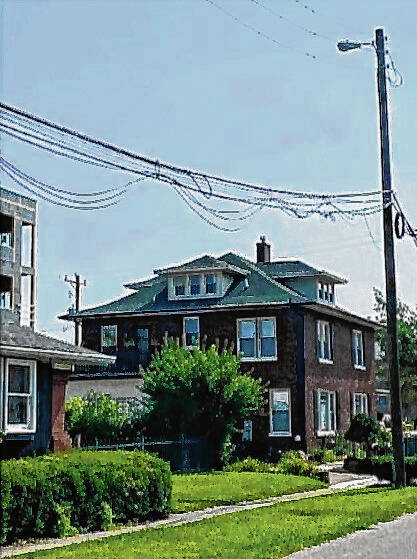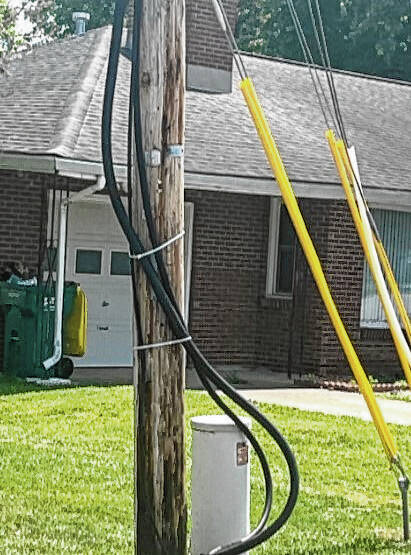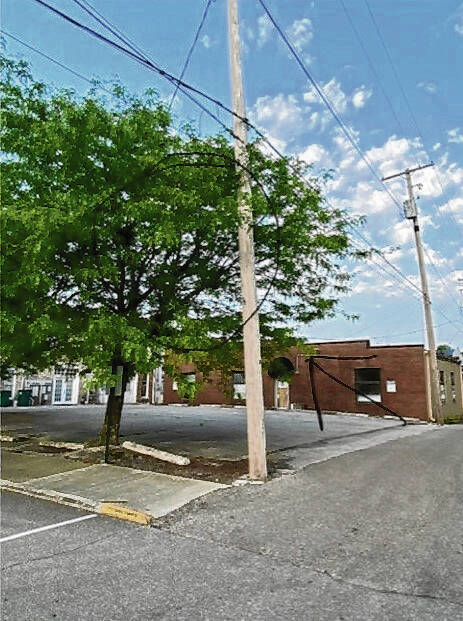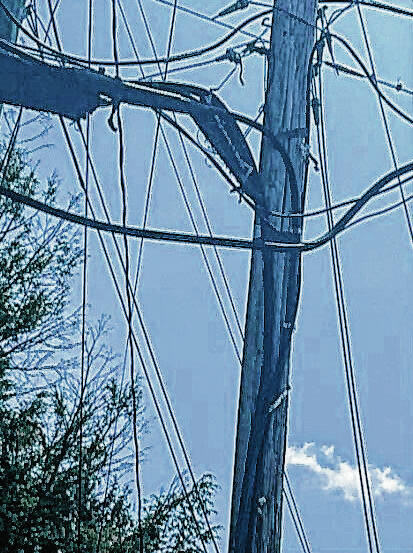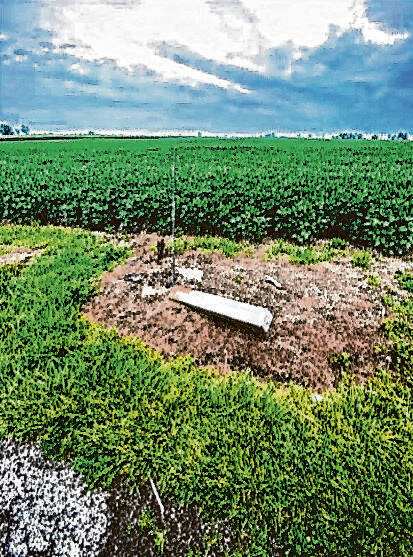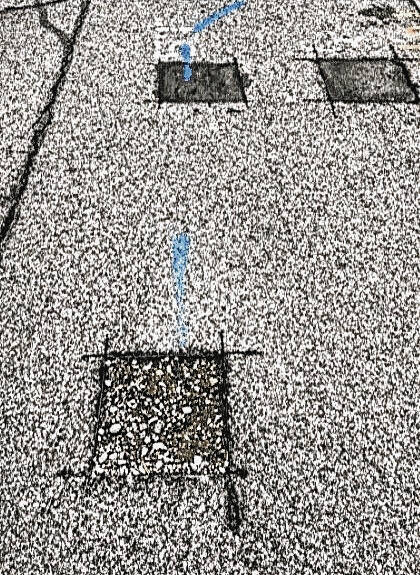The city of Franklin is taking steps to solve a problem called “cable pollution.”
The pollution is a broad swath of problems that officials say is the product of irresponsibility by telecommunications companies and the state’s lack of regulation on them.
City officials say cable pollution is present all over Franklin, across Johnson County and the state. It manifests in cables dangling from telephone poles, cables that are improperly secured to poles, cables that are left in yards after the homeowner changes internet or cable TV providers and more.
Often, companies leave behind a mess after they lay new cables underground. Additionally, the contractors telecommunications companies hire often don’t repair yards and city streets properly, which leaves homeowners and the city on the hook for repairs. The contractors have also often bored through other utility lines, typically for gas or sewer, because they failed to properly locate existing lines.
Franklin has been trying for years to get the telecommunications companies that serve the city to fix the problems with little success — in the process using city resources to document the problems and contact the companies. Recently, Mayor Steve Barnett came up with an idea to fix the problem after a meeting of state and Johnson County officials on the problem.
The idea came up after he met Natasha Mershon, founder and CEO of The Masters Group, a Bargersville company that has seen both sides of cable pollution. The company has worked with both telecommunications companies on plans to install new cables and has worked with the town of Bargersville on auditing the telecommunications cables that are tied onto the poles owned by the town’s electric utility.
The Franklin Board of Works and Public Safety earlier this month hired The Masters Group to do an audit of all the cables in the city and contact utilities to fix all problems they find. The company will also advise city officials on how to tighten up its ordinances to address cable pollution going forward. Barnett also plans to share ideas with local legislators in hopes they will carry a bill to address cable pollution on the state level.
What is cable pollution?
The companies largely behind the pollution in Franklin are Xfinity, Brightspeed and Metronet. The city hasn’t had any problems with JCFiber, the fiber internet utility run by Johnson County REMC, Barnett said. Duke Energy, the largest electricity supplier for Franklin, has also been involved because telecommunication lines are typically tied to electric poles, Mershon said.
While Franklin officials have noticed unsafe or incorrect work practices while contractors are installing cables, officials and homeowners have not been successful in holding companies accountable.
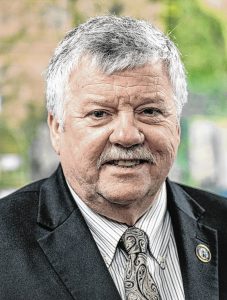
Barnett has heard of Franklin homeowners who have had their basements fill up with sewage years after a cable company bored through their sewer lines. Each time something like this happens, the sewer utility finds that a contractor bored through the line, Barnett said.
“They (other utilities) spot and locate the sewers. Well, these cable companies don’t, and lo and behold, they’ll bore through somebody’s sewer and you don’t find it for six months to two years, and in some cases, five years,” Barnett said. “They finally get clogged up and then people have issues with their sewers and these cable companies are causing it.”
This happens because while companies call 811, they don’t typically do a practice called “potholing” to check the depth of existing utilities, Mershon said.
“What’s happening is a lot of these telecommunication companies, they hire construction companies that are rushing through the job,” she said.
Haste also comes into play for issues with cables that aren’t secured properly, and with loops of cables that are placed near the ground instead of at the tops of poles, Mershon said.
When companies have to bore into street, they typically patch a very small area with cold patch. That leads to potholes that the city has to fix at a cost to taxpayers later, Barnett said.
Companies also aren’t required to remove old infrastructure, so unused cables are left buried in the ground and remain on poles.
“We need to put a stop to that because anytime you install new cable in a route, if there’s a dead cable, you do what’s called a rake out and they’re not doing that,” Mershon said.
Cables that aren’t properly secured or are left after they are no longer used give cities and towns a look of untidiness, but the larger issue is safety. Mershon has seen and heard reports of children swinging on unsecured cables. Though telecommunications wires aren’t typically electrified, they could be, and touching a live wire is commonly fatal, she said.
Vaults and holes leading to old underground cables and decommissioned pedestals are also a hazard. People could be injured, or could bust tires on a car or bike if they run over them, Mershon said.
Why hire a firm?
Barnett himself and city employees have been documenting cable pollution for years, but they have struggled to make headway with the companies, he said.
“We’ve been taking pictures of these and trying to get these companies to come and take responsibility and fix their stuff. And it is a real hard task to work with them and get this kind of stuff done,” Barnett said.
So the goal of hiring The Masters Group is to document every current utility problem in the city and reach out to the utilities to address them. The city enlisted the group to help with a few initial problems and utility companies have been much quicker to respond to Mershon than they had been to city officials, Barnett said.

The audit is already underway and The Masters Group has their work cut out for them.
“I drove through Franklin and we started the audit already just to get an idea of where things were and how bad it is coming in,” Mershon said. “I don’t think I got through two blocks without stopping a dozen times and taking pictures.”
With each problem found the group plans to contact the companies and give them a timeline to correct problems with their cables. This will be coupled with work on updating the city’s ordinances, which could include fines that will help hold the companies accountable, Mershon said.
The ordinance update will be subject to approval by the city council and it has not been proposed at this time.
The study is expected to be done in three to six months, Barnett said. The contract is for up to $60,000 of work, with the final total depending on how many hours the work takes to complete.
More regulation?
Lack of regulation of telecommunications companies is the main underlying issue. Other utilities such as gas, water, and electric companies have much more oversight, said Barnett, who worked in the utility industry before becoming mayor.
What is lacking is enforceable state standards, he said. Franklin officials have used some tools at their disposal such as issuing fines or denying permits, but these only go so far, he said.
Companies also tend to work fast and do work that is sub-par, Mershon said. Even when contractors are provided accurate documents they don’t always follow the plans and there’s no quality control on their work, she said.
“We have to get it resolved at a local level. And then go from the local level, we work on passing a law with the state (legislature) to get the construction companies to start following the procedures needed — because it’s not just Franklin,” Mershon said.
State legislators seemed open to helping at the meeting, but none have committed to carrying a bill, Barnett said.
“I don’t know what’s going to come out of it. All I know is I want to make our legislators aware,” he said. “And I want to give them the opportunity to try to help fix this and give what our communities what we need out of these companies.”
More regulation would put cable companies on equal footing with other utilities, he said.
“I don’t think any mayor asked for anything above what it should be. We’re not asking anything more out of them than the electric and sewer or the electric and water and the gas,” Barnett said. “They all do the best they can and do work in the field with the customers and work with the neighborhoods but these cable companies — they do not.”


